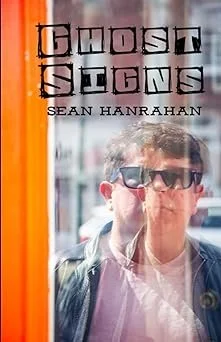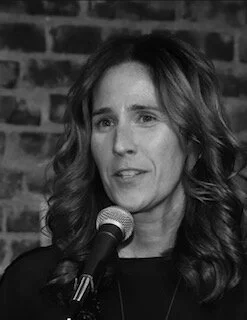Ghost Signs
by Sean Hanrahan
Alien Buddha Press
$11.25
You can purchase a copy here.
Reviewed by Katch Campbell
Transcendence and Symbols: A Review of Sean Hanrahan’s Ghost Signs
In Tibetan, the word for awakening is changchub: chang (“self-purifying”) and chub (“self-expanding”). It is said that the awakened state is the natural path our mind seeks to move obstacles and misunderstandings behind us so we can continue outward.
As we age, our awakened state provides a new view of life. In youth, we see our body as a noun, an entity with fixed functions and properties and as we age our bodies change so that if we continue to look at them from a fixed lens, we become frustrated inside a stunted state of being. However, if we are growing outward, toward wisdom or enlightenment we begin to see our body as a verb with functions and properties that are in constant motion, changing through time and perspective. The body as verb includes an array of elements without boundary, in constant change that includes the process of aging. Aging is a gathering of symbols then letting them go on our way toward transcendence.
Sean Hanrahan’s new full length collection, Ghost Signs, reflects on one life’s symbols, the obstacles of body as noun, and the freedom of awakening to body as verb. It is a narrative of a life full of joy, confusion, passion, pain, suffering, hope, and eventually letting go.
While the collection of nearly 50 poems does not strictly follow a linear timeline, there is a sense of young to old. Innocence and wisdom are introduced early on.
In the first stanza of the first poem, “Lemon Hill,” Hanrahan recounts
I sit here among the purple
Weeds of Lemon Hill, glancing
Down towards Boathouse Row,
Reflecting on the future probabilities
Of my former selves. Certain mistakes
I have made led me to you, my love,
And the second stanza provides a nod to the collection’s arc:
Which of my important days led me
To this moment on Lemon Hill,
And which ordinary days were perfect
In that they had no subsequent impact,
In that they were self-contained,
Satisfied with themselves and a meandering,
Inconsequential unspooling.
There are poems that speak to body as noun: “Skinny Tattooed Legs,” “Autumn Leaves,” “Boots and Bonnets” as well as body as verb: “History Lesson,” “Accordion Line,” “Wedding Gift,” and “Turbulence”. Each skillfully combines past with present and offers up lessons that lead to transcendence.
Part of the collection’s strength is Hanrahan’s use of object as symbol. I am reminded of Simic’s use of objects as a commentary to everyday life and to the existential. Hanrahan uses well placed object poems throughout the collection to slow the pace of the collection, draw out the importance of the objects within other pieces, and to reflect. Specific poems to look for include “Couch,” “Avo,” and “Emma”.
The heart of Buddhist practice is to cease placing limits on the vast expanse of the awakened state. To let go of thinking that seeks to make the awakened state serve our anxious purposes, to let awareness, observation, attentiveness dissolve into the vast awakening as streams flow to the sea.
Dogen Zenji said: “When the world ends, and the fires blaze unobstructedly through everything, and all falls to ruin, we just follow circumstance.”
Hanrahan’s Ghost Signs takes the reader on a journey toward transcendence, through body, mind, object, and narrative. As he writes in the last lines of the final poem: “But write about me, write about us, write about yourself and pretend it’s me. What’s the difference? We are what people choose to commemorate.”
Katch Campbell is a connector. With a master’s degree in Science and an MFA in poetry, she creates metaphors for her patients and others about the world around us. Her work is an inquiry on the atrocities we commit consciously and unconsciously against each other and the universe. Katch serves as Vice President and is a permanent faculty member at the River Pretty Writing Retreat, a bi-annual workshop in the Ozarks. She has co-led immersive poetry trips to Slovenia and Italy and used to edit for ZoMag.com.


